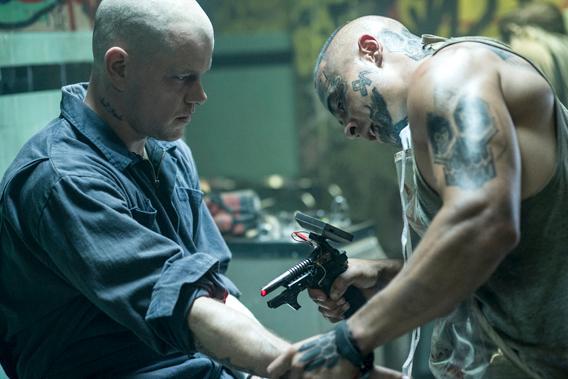Neill Blomkamp’s first film, District 9, did a lot with a little, turning a sci-fi story about segregated space aliens into a vivid (if overlong) pop parable about South African apartheid. His second one, Elysium—a sci-fi thriller on a much larger scale, complete with Hollywood stars and state-of-the-art CGI effects—does a little, sometimes shockingly little, with a lot.
Like District 9, Elysium takes on contemporary problems of economic and social injustice—this time not racial prejudice but the vast worldwide gulf between haves and have-nots. But after taking some pains to imagine and present a mid-22nd-century world that’s a plausibly grim extrapolation of the one we live in, Blomkamp proceeds to spend the last two-thirds of his film crashing spaceships into lawns, or staging high-tech fistfights between Elysium’s stolid hero and his even duller arch-nemesis. It’s a waste of a perfectly good dystopia.
In 2154, Blomkamp’s script posits, Earth will have become a kind of vast slum, where you’re stuck scrabbling for a hand-to-mouth existence if you don’t have the means and the connections to move to Elysium. This paradisiacal off-world colony is housed in an elegant wheel-shaped structure that’s visible from Earth, taunting our planet’s struggling masses with its unattainable proximity. Elysium’s atmosphere—and, confusingly, its political system as well—seem to be maintained by a vast computer network that surveys and controls everything that happens in the colony. Elysians live in a luxury unimaginable to earthlings, their every need attended to by robot servants; their sleek, modern houses look like something out of a ’90s perfume commercial. Though there’s a puppet president (Faran Tahir), the true power in Elysium belongs to the steely secretary of defense, Delacourt (Jodie Foster), who enforces a brutal anti-immigration policy: No unauthorized earthlings can be permitted to breach the colony’s atmosphere, not even to make emergency use of the miraculous medical bays that are an Elysian household appliance. (Face destroyed in a grenade attack? Just hop into this magic glass tube and you’re good as new.)
Back home on earth, there are some serious medical emergencies in need of magic-tube treatment. Max (Matt Damon), a factory laborer who’s one of the rare Anglos living in a predominantly Hispanic Los Angeles, has received a fatal dose of radiation in an industrial accident and has only five days to live. His childhood best friend, Frey (Alice Braga), now a nurse, is the single mother of a little girl (Emma Tremblay) with terminal leukemia. Max bribes a friend in the criminal underworld, Spider (Wagner Moura) to secure them passage to Elysium, and, after an inordinately long series of battles in and around various space vehicles, they make it there—only to find themselves the subject of a manhunt ordered by the icy Ms. Delacourt and principally conducted by her henchman, the mentally unbalanced renegade Kruger (Sharlto Copley).
Elysium has some very basic structural and story problems: The last half is essentially one barely interrupted chase, leaving no breathing time for either the characters or audience, and the incoherent, absurdly simplistic ending—which I should probably discuss in a second location, so as not to spoil—would be an insult to the intelligence of an audience of llamas. But all these flaws might have been forgiven if the first half of the movie had loaded up the audience with enough goodwill to last us through the long slog of action sequences to come.
Instead, Elysium seems from the outset in a hurry to get past who the characters are and on to what they represent. Max and Frey are a dull-as-dirt leading couple, a grunting lug and an angelic do-gooder whose only connection is established in short, sentimental flashbacks to two children running in slow motion. Foster’s supercilious, empathy-free defense minister is the most memorable character in the movie (if only because of her supremely indeterminate accent), but the focus shifts too early from Delacourt to the far less interesting villain played by Sharlto Copley. Copley, a distinctive South African actor who was arresting in the complex lead role of District 9, doesn’t get to do much more than snarl menacingly as he runs down corridors.
Most disappointing of all, though, is that cop-out of an ending, which makes a chump of any viewer who was trying to take this movie’s claims to sociopolitical relevance seriously. If righting complex, historically rooted geopolitical (hell, cosmopolitical!) injustices were as easy as the last 15 minutes of Elysium suggests, we’d never have needed to build that off-world colony in the first place.
